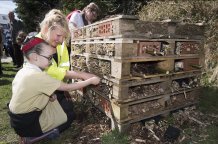
Children's bug hotel help nurture nature in an unexpected place
Children‘s bug hotel help nurture nature in an unexpected place
More than 100 bug rooms for the bug hotel will start to help bring a Redruth playing field back to life as students from year 4 at Treleigh Community Primary School provide accommodation for unloved insects to help grow nature.
The bug hotels are part of a project to attract nature back to urban areas alongside flowers, trees and better natural facilities.
Treskerby Playing Fields rejuvenation is one of 30+ projects being delivered by Cornwall Council thanks to a major investment in local urban green spaces across a number of Cornish towns as part of the Green Infrastructure for Growth (GI4G) project which has received £2,800,500 of funding from the European Regional Development Fund.
Cornwall Council Cabinet Member for Environment, Sue James, said: “Over the next two years, £3.5 million will be spent on public recreational areas, roadside verges and old churchyards to make them better places for people and for wildlife.
“The bug hotel these students have built are just the beginning of the nature revolution with more projects underway or planned in at least 30 more locations. It’s all about creating nature-rich habitats, which by the end will cover an area equivalent to 35 rugby pitches,” Cllr James said.
“We are on a mission to improve urban open spaces so that they become more sociable community hubs, celebrated and enjoyed by local people. We’ll be planting wildflower meadows, trees and orchards, creating Cornish hedges and ponds. We’ll also work with local communities to re-think areas of our green space, building on how they are currently used.”
The project asked people who lived near and used the park, as well as the local scout group, what they would like to see, with the plans modified to include natural play through land form and planting. There are also plans to organise community events to make other wildlife friendly features including meadow seed sowing and spring bulb planting.
Professor Juliet Osborne, Director of the Environment and Sustainability Institute and Chair in Applied Ecology at the University of Exeter said “Urban areas are increasingly acting as refuges for our pollinators, but have been seen as less important in the past. This project is a fantastic opportunity to increase the number of bumblebees and solitary bees in towns across Cornwall. The University of Exeter is excited to be part of such a positive project, and contribute to our local environment.”
More than 30 projects will be delivered in Redruth, Pool, Penzance, Bude, Camborne, Hayle and Saltash.
More details on each can be found here www.cornwall.gov.uk/gi4g
Date: 20 April 2018
